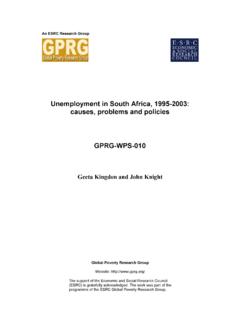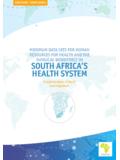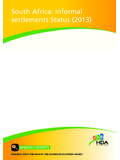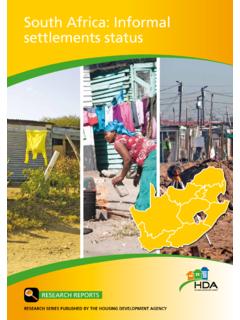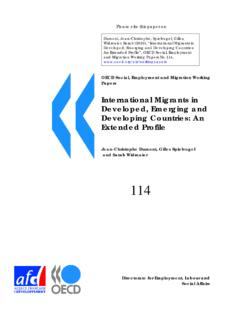Transcription of THE SUPREME COURT OF APPEAL OF SOUTH AFRICA
1 THE SUPREME COURT OF APPEAL OF SOUTH AFRICA JUDGMENT CASE NO: 20028/2014 Reportable In the matter between: THE MINISTER OF TRANSPORT NO FIRST APPELLANT THE ACTING DIRECTOR GENERAL FOR THE DEPARTMENT OF TRANSPORT NO SECOND APPELLANT and PRODIBA (PTY) LTD RESPONDENT Neutral Citation: Minister of Transport v Prodiba (Pty) Ltd (20028/2014) [2015] ZASCA 38 (25 March 2015). Coram: Navsa ADP, Wallis & Mbha JJA et Dambuza & Gorven AJJA Heard: 19 February 2015 Delivered: 25 March 2015 Summary: Agreement with service provider signed by Director-General without approval of Minister held no authority to sign on behalf of the Department of Transport decision with financial implications of approximately R1 billion decision polycentric in nature within province of the Executive agreement signed without competitive process if agreement upheld it would mean that following upon the award of a single tender in 1997 one service provider would have had a monopoly in the production of drivers licences for over 20 years militates 2 against constitutional principles of transparent and accountable government imperative statutory and treasury requirements flouted agreement held to be void.
2 3 _____ ORDER _____ On APPEAL from: The North Gauteng High COURT , Pretoria (Ebersohn AJ sitting as COURT of first instance). The following order is made: 1. The APPEAL is upheld with costs including the costs of two counsel. 2. The order of the COURT below is set aside and substituted as follows: (a) The application is dismissed with costs, including the costs of two counsel. (b) The third addendum agreement is declared void ab initio and set aside. (c) The respondent in the counter-application is ordered to pay the costs of the counter application, including the costs of two counsel. 4 _____ JUDGMENT _____ Navsa ADP (Wallis & Mbha JJA et Dambuza & Gorven AJJA concurring): Introduction [1] At the beginning of 1997 a tender was awarded by the Department of Transport (the Department) for the provision of a bureau service that would produce a personalised new style SOUTH African drivers licence, administer the production process and keep the licences safe until they were delivered to the licencing authority.
3 This service was to be provided for a period of five years. Shortly after the award of the tender, and the conclusion during February 1997 of an agreement, the rights vested in the successful tenderer were ceded to Prodiba (Pty) Ltd (Prodiba). Some extension periods were provided for in the agreement concluded upon the award of the tender. That fact and further proposals by Prodiba and negotiations with the Department resulted in the former providing the services referred to above at substantial remuneration until 28 February 2014. The present APPEAL by the first and second appellants, the Minister of Transport (the Minister) and the Acting Director-General in the Department (the ADG), respectively, followed on a successful application by Prodiba, in the North Gauteng High COURT , to enforce an agreement concluded on 1 February 2013 by the erstwhile Director-General of the Department, whose authority is disputed by the appellants.
4 In terms of that agreement Prodiba was entitled to produce new smart-card drivers licences for a period of five years, commencing on 1 March 2014. The financial implications for the state were estimated at R1 097 billion. The present APPEAL , with the leave of this COURT , is directed against those results. If Prodiba were to succeed it would mean that following upon a single tender process during 1995-1997, a single contractor would have had an uncontested monopoly in the production of drivers licences for a period of more than 20 years. Do our constitutional 5 norms and values countenance such a situation? The short answer is no. The present APPEAL might rightly be described as the Department belatedly coming to its senses. The detailed background and the reasons for the aforesaid non-affirmative conclusion are set out below. Detailed background [2] During 1995/1996 the Cabinet took a policy decision to migrate from the old drivers licence regime to a new card system for drivers licences.
5 As a result the Department issued a tender through the State Tender Board to provide the services referred to in the preceding paragraph. After following proper tender processes the tender was awarded to Face Technologies (Pty) Ltd (Face Technologies), Idmatics and Nkobi Holdings (Pty) Ltd, which led to the Department and Face Technologies concluding a written agreement on 28 February 1997, for the manufacture of driver s licence cards. It is common cause that shortly thereafter Face Technologies ceded its contractual rights to Prodiba. The contract period was repeatedly extended. The last extension was from 1 March 2012 until 28 February 2014. These repeated extensions, by virtue of contractual provisions and negotiations, appear legally suspect but for present purposes need detain us no further. [3] Prior to the last extension the Department considered updating and changing the technology related to drivers licences.
6 There was a dispute about whether the idea to change the technology and migrate to a new system, namely a smart-card driver s licence, emanated from the Department or Prodiba. That dispute was ultimately irrelevant. [4] On 1 February 2013 the erstwhile Director-General of the Department, Mr George Mahlalela, signed the agreement at the centre of the present dispute. That agreement purported to bind the Department and SOUTH AFRICA to migration from the initial card system to a smart card microchip-based driving licence system, with Prodiba being responsible for its production, with the concomitant financial implications set out in 6 paragraph 1. The agreement was entitled the Third Addendum Agreement . The agreements that followed on the one concluded upon the award of the tender were entitled and referred to as the First and Second Addendum agreements, respectively. I shall, in due course, deal with that description and the employment of what I consider to be semantic stratagems.
7 In adjudicating the validity of the third agreement it is necessary to consider the events and processes leading up to its conclusion. [5] During October 2012 an internal memorandum was prepared by the Department, which envisaged the migration to the new smart-card technology and anticipated negotiations in that regard with the current service provider, Prodiba. The internal memorandum was in line with a written business case prepared by the Department. What was ultimately intended was a Departmental takeover of the entire production process. The stated purpose of the memorandum was to seek approval from the Minister for the take-over of the services currently provided by the service provider and to change the current paper format driving licence card to plastic chip based card. [6] The documents reflect a commonplace process of seeking approval within the structures of government. The proposal was prepared by an Acting General Manager, Ms Zwane, in a memorandum addressed to the Minister of Transport.
8 Its recommendations were supported by the Acting Chief Financial Officer and the Deputy Director-General: Roads Transport. It was then referred to Mr Mahlalela, who recommended it and who made a written note stating the following: Need to brief Deputy Minister and the Minister on their proposals. The memorandum was then sent to the Deputy Minister, who noted this recommendation and said that it was highly supported. That was on 20 December 2012. When the memorandum was placed before the Minister of Transport on 24 February 2013, he deleted the words APPROVED/NOT APPROVED and added a hand-written note stating the following: Briefing to precede approval. 7 [7] In the answering affidavit the Department was emphatic that the briefing of the Minister had not occurred prior to the conclusion of the agreement. It was adamant in its assertion that there had been no approval of this migration to the new technology or of the cost implications, by the Executive arm of Government, either in the form of a Cabinet decision or indeed even by the individual responsible member of the Cabinet, the Minister.
9 The sequence of events, set out in the preceding paragraph, supported the Department s stance. [8] I consider it necessary to record that in the litigation leading up to and including this APPEAL , Mr Mahlalela was conspicuously absent. No affidavit by him was filed by either party, setting out the basis on which he had purported to conclude the agreement. It was unchallenged that Mr Mahlalela was informed, during September 2012, that his contract as Director-General in the Department would not be renewed when it expired on 28 February 2013. Mr Mahlalela signed the agreement in question on 1 February 2013. The evidence demonstrates that he did so without having briefed the Minister and without having obtained his approval. [9] On 5 February 2013, Mr Mahlalela, purporting to act on behalf of the Department, wrote the following letter to the Director-General of National Treasury, ostensibly to create the impression that he had complied with statutory or Treasury prescripts: 1.
10 The Department of Transport ( the Department ) produced driving licence cards on a fully outsourced Bureau service since March 1998 on contract RT6969SA(G). 2. The original contract was for a period of 5 (five) years. The contract was then extended for a period of 13 (thirteen) months, before a second production period of 5 (five) years was included. The contract was subsequently extended on various occasions for multiple periods ranging from 1 (one) month to 18 (eighteen) months. 3. The Department on several occasions advertised tender specifications for a new service provider but failed to complete the process due to the technical nature, and due to legal challenges. 4. The Department subsequently took a strategic decision, supported by the Ministry and EXCO not to go out on open tender for the continuation of this service but rather to perform this function in-house. 8 5. The bureau service for the production of driving licence cards will be performed by the Driving Licence Trading Entity ( DLTE ).










